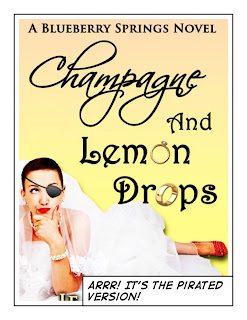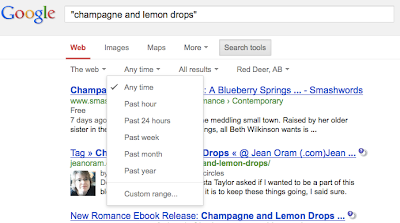I've been writing women's fiction/chick lit/romance for a few years and released my first book, Champagne and Lemon Drops, last March (2013). Since then, I have released its follow up novel, Whiskey and Gumdrops, and I'm about to release the third in the series, Rum and Raindrops (Feb 22). Over the past year, I have learned some cool things about being a romance author. First of all, not to be shy about it. Second, it is a fabulous market to be in. And lastly, that romance readers are simply the most amazing, kind, and loving readers any writer could ever possibly ask for.
Here are my five reasons on why it rocks to be a romance author.
1. It is a ton of fun. You get to spend whole novels pushing characters apart, pulling them together, upping the heat and intensity, and weaving a plot around it all to really amp up their emotions.
2. The research is damn sexy. Need inspiration for the heroine and heroes' first kiss? Call your hubby on over. Hello!
3. There are many sub genres there is a place for every crazy idea as long as there is a romantic thread at the heart of it. Vampires or witches? Paranormal romance. History? Historical romance. Murder and espionage? Romantic suspense. Military heroes? Military romance. There is room for everyone and indie romance writers will find, to their delight, that they can find themselves beside some pretty big names on the New York Times or USA Today bestseller list. There is room for everyone in romance. (And yes, that does sound slightly kinky to me, as well.)
4. Inspiration is everywhere. People fall in love every day.
Listen to the radio--what do you hear? Love stories. Watch an action flick? Love story plot line. Know why romance is everywhere? Because love gives us hope. It makes us feel good. There is nothing as awesome as the guy getting the girl. Romance novels are about feeling and connecting--and in today's world who couldn't use a bit more of that?
5. Romance readers are veracious. They are loyal, intelligent women. They understand that a happily ever after doesn't just happen and that there are obstacles and hurdles along the way. They understand heartbreak. Loss. Feelings of doubt. Worries. Obligations. Hardships. And of course, the feelings of longing, love, life, and being swept away by a hunk who truly listens and understands.
Romance readers light up when you mention you write romance. They lean a little closer, eager to hear what you've written. They always welcome a new author and have room for your books on their Kindle. There's always the opportunity to be their new favourite.
Romance readers are risk-taking, vivacious women with heart and soul and will spend their last dollar on a good read that will sweep them away and make them, dream, laugh, cry, and love.
Romance readers are dreamers. They are the best of the best in the world. Their hearts are big. So huge. Sometimes they are quiet about their need for love. Sometimes they're not.
But, I think, it's time to quit apologizing for being a romance reader or writer. We are strong. We are the hearts of the world. We go through the emotional wringer with every good book and come out the other side, stronger and more empathetic.
Romance readers are right there with you. Ready to feel what you are feeling.
So today, turn to the person beside you and ask them if they read romance. You might just find that the most loving people in your life read romance and that it this 'fluff' is actually intelligent, well-plotted, well-written prose that can draw in even the most reluctant reader.
Happy Valentine's Day from one romance reader and writer to another.
 And if you haven't read a romance yet, my book Whiskey and Gumdrops is on sale today as a thank you to my readers and is only $0.99 as an ebook. It's cheaper than a box of chocolates, lasts longer, and will make you feel better about yourself by the time you finish it. Not like a box of chocolates. So, go ahead. Indulge. Be fearless. Read, dream, laugh, and love. I'm right there with you.
And if you haven't read a romance yet, my book Whiskey and Gumdrops is on sale today as a thank you to my readers and is only $0.99 as an ebook. It's cheaper than a box of chocolates, lasts longer, and will make you feel better about yourself by the time you finish it. Not like a box of chocolates. So, go ahead. Indulge. Be fearless. Read, dream, laugh, and love. I'm right there with you.Jean Oram writes romance and is a sucker for a good romantic plot line. You can find her on Facebook, her website, and on Twitter (@jeanoram). She is the author of the Blueberry Springs series and has been publishing her stories independently. She is completely in love with her readers and will be attending RWA this summer.











